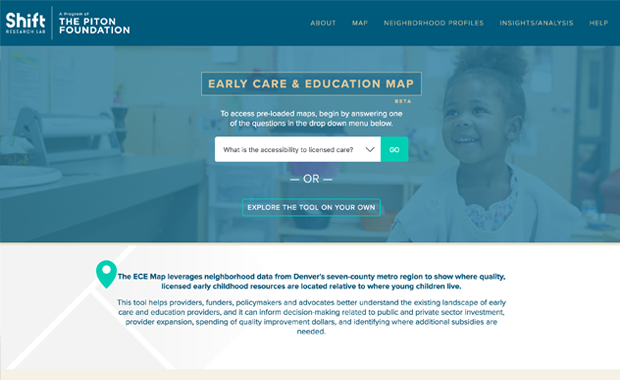
Happy with our successes working with our longtime client, Shift Research Lab (a program of The Piton Foundation), we took a similar approach to previous projects, pushing a method we know works even further. We used a comprehensive stakeholder engagement process to develop the Early Care and Education Map. This process included a smattering of user-centered design activities and took place over the course of four meetings. In the end to ensure we were meeting our objectives, the OMF Team facilitated user tests prior to launch in which the stakeholders had the opportunity to contribute their ideas to the vision and subsequently preview the tool to evaluate its execution. There were many stakeholders represented with a variety of viewpoints, needs, and goals as to how the tool should serve the community. The OMF Team skillfully negotiated the wide range of needs to make a product that works for everyone.
OMF and Shift collaborated closely throughout the entire process. The Shift Team calculated the accessibility measure across the region and the OMF Team took the data early on, integrating the nature of information and the stakeholders’ needs to drive the design. The result is a tool uniquely designed for the nuanced stakeholder needs, visualizing multiple layers of information to build maps that are highly relevant to each, individual user.
This tool makes sharing extremely easy as well. Saved searches can be shared with a URL link and neighborhood reports can be generated for printing and downloading. It runs through Shift’s in-house data system, Data Engine a fully integrated datasource.
The OMF Team had their work cut out for them making the tool easy to navigate with this large aggregate of data. We were committed to the project’s success. It fills an important gap in helping providers, funders, policymakers and advocates better understand the landscape of early care and education providers. This information impacts decision-making in public and private sector investment, provider expansion, spending, and identifying where additional subsidies are needed. Congratulations to Shift Research Lab for yet another innovation in public service!
